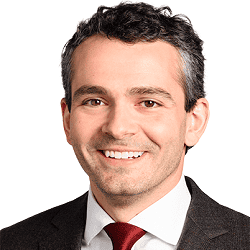
Ryan T. Anderson
2007 Publius Fellow
What is your current position?
I’m the William E. Simon Senior Research Fellow in American Principles and Public Policy at The Heritage Foundation, and I’m the Editor of Public Discourse, the online journal of the Witherspoon Institute.
What inspired you to choose this career path?
As the great political philosopher Homer J. Simpson once said, the sweetest two words in the English language are de fault. And to a certain extent that’s the case for my career path: I never really choose it, it just sort of happened. Being an undergraduate at Princeton during the attacks of 9/11, the debates about stem cells, the protests over the wars in Iraq and Afghanistan, and the very beginnings of the efforts to redefine marriage—that all got me thinking more seriously about ethics and politics. After graduating I spent 2 years as Robby George’s research assistant, then two years working for Richard John Neuhaus at First Things, then a PhD in political philosophy at Notre Dame—and the next thing I know I’m doing this.
What are you currently working on?
I just finished writing a book on sex, gender, gender identity and gender dysphoria, When Harry Became Sally: Responding to the Transgender Moment. The basic argument is that the best biology, psychology, and philosophy all support an understanding of sex as a bodily reality, and of gender as a social manifestation of bodily sex. Biology isn’t bigotry. In the book, I offer a balanced approach to public policy issues, a nuanced vision of human embodiment, and a sober and honest survey of the human costs of getting human nature wrong.
And those costs are real. My book introduces readers to people who “transitioned” but found themselves no better off, and then “detransitioned.” Especially troubling is the suffering felt by adults who were encouraged to transition as children but later came to regret it. And there is a reason that many do regret it. The most helpful therapies focus not on achieving the impossible—changing bodies to conform to thoughts and feelings—but on helping people accept and embrace the truth about their bodies and reality. And that’s why I wrote this book. To help all of us think about these issues more carefully, and to respond to those in need more charitably.
How did you hear about the Claremont Institute?
I had been reading the CRB for a couple years, not sure how I had first heard about it, when I decided to apply for Publius in 2007. I was working as an assistant editor at First Things at the time—so maybe that’s how I had heard about the CRB—and the fellowship opportunity looked great for someone like me. I’d learn about America, political philosophy, and journalism, all in one seminar.
What’s your fondest memory of the Claremont Institute?
Without a doubt it was the time that Harry Jaffa spent with us.
There are all sorts of educational programs out there for current and rising conservative professionals. What do you think makes the Claremont Institute’s Fellowships unique?
Claremont is unique in a couple of respects. First, the seminars are all at the intersection of theory and praxis, as the kids say. Second, you get a unique perspective on that theory and praxis. The Claremont approach is decidedly pro-America and pro-Founding, where America and the Founding are understood to be the peak of Western political thinking and practice. Third, the people, food, and climate are top-rate.
If you could have a drink with an American Founder, or any great thinker, who would it be, why, and what would you order?
This may upset the powers that be at Claremont, but it wouldn’t be an American Founder, or even one of the thinkers most connected to the Founding. It would be Thomas Aquinas. He’s the thinker who’s most influenced my own thinking. But I think he’s wrong on a couple of items, and I’d like to ask him about it. Of course we’d do this over scotch.
Who was more important for their time, George Washington or Abraham Lincoln? Why?
I’d go with Lincoln. And not just “more important” for his time, but for ours. His speeches, and the Lincoln-Douglas debates, still instruct us today.
What is the greatest challenge facing the United States today?
Fragmentation. We have very little common culture, common values, common beliefs. And as a result it’s straining our social and political fabric, and it is raising serious questions about whether classical liberalism can survive.
What books are you reading right now?
Patrick Deneen’s Why Liberalism Failed, Ross Douthat’s To Change the Church: Pope Francis and the Future of Catholicism, Roger Scruton’s On Human Nature, Scalia Speaks, and A Reader in Catholic Social Teaching: From Syllabus Errorum to Deus Caritas Est.
What book has left a lasting impression with you and why?
C.S. Lewis, The Abolition of Man. Such a clear statement of natural law thinking. I created a list of other books that have shaped my thinking here: https://www.amazon.com/shop/ryantand
What is your favorite cultural/recreational pastime (or hobby)? Why?
Music and mountain biking. I’m not sure I can say “why,” but from an early age I was drawn to music. I majored in it at college, and in my home in DC I have a piano, a hammer dulcimer, a marimba, a vibraphone, a drum set, an electronic drum set, some conga and a pair of bongo. My neighbors love me. I also like mountain biking, and go out to Front Royal, VA and bike or hike in the Appalachians there every couple of weeks.

